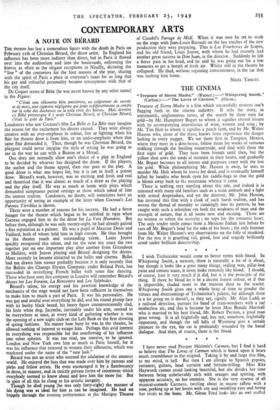CONTEMPORARY ARTS
A NOTE ON BRARD
THE theatre has lost a tremendous figure with the death in Paris on February nth of Christian Berard, the decor artist. In England his influence has been more indirect than direct, but in Paris it flowed over into the auditorium and into the boulevards, enlivening the bistros as often as the elegant receptions in Neuilly, dictating the "line " of the couturiers for the four seasons of the year, sharing with the spirit of Paris a place in everyone's heart for so long that his gay and colourful personality became synonymous with that of the city itself.
De Coquet wrote of Bebe (he was newer known by any other name) in the Figaro:
"C'etait une silhouette bien parisienne, un colporteur de secrets et de mots, une cigarette negligente qui jetait indifferemment sa cendre sur la robe des duchesses ou la wile ciree des bistros. Mais derriere ce Bebe pittoresque ii y avail Christian Berard, et Christian Berard, c'etait le goat de Paris."
Londoners who saw Cocteau's film La Belle et La Bete may imagine the reason for the excitement his decors caused. They were always creative with an over-emphasis in colour, line or lighting when his flair for theatre drew it from him, or an under-emphasis when that same flair demanded it. Thus, though he was Christian Berard, the playgoer could never imagine the style of setting he was going to see in the way he can with a Beaton or a Messel.
One does not normally allow one's choice of a play in England to be decided by whoever has designed the decor. If the players, the author and the theme appeal, then one goes to the play. A good decor is what one hopes for, but it is not in itself a potent draw. Berard's work, however, was so exciting and fresh and real and theatrical that it was almost as much of a draw as the playing and the play itself. He was as much at home with plays which demanded sumptuous period settings as those which asked of him the utmost realism. Londoners, no doubt, will sometimes have an opportunity of seeing an example of the latter when Cocteau's Les Parents Terribles is shown.
There were a number of reasons for his success. He had a fierce hunger for the theatre which began to be satisfied in 193o when Cocteau engaged him to do the decor for La Voix Humaine. But before then, although he was only twenty-eight, he had already gained a fine reputation as a painter. He was a pupil of Maurice Denis and Vuillard, both of whom held him in high esteem. He thus brought to the theatre youth and outstanding talent. Louis Jouvet quickly recognised this talent, and for the next ten years the two together put on one important play after another from Giraudoux to Moliere, with Jouvet playing and Berard designing the decors. More recently he became attracted to the ballet and cinema. Ballet had not drawn him sooner probably because it is only recently that the Ballets des Champs Elysees Company, under Roland Petit, has succeeded in revivifying French ballet with some fine dancing. Those who have seen this company in London will remember Berard's decors for Les Forains, La Rencontre and Les Sylphides.
Berard's talent, his energy and his practical knowledge of the mechanics of the stage would not have been sufficient in themselves to make him so much a part of Paris. It was his personality. He was gay and zestful over everything he did, and his round plump face with its bushy black beard, his heavy figure unconventionally clad, his little white dog, Jacynthe, inevitably under his arm, seemed to be everywhere at once, at every kind of gathering whether it was the opening of a new night club on the Left Bank or the first showing of spring fashions. No matter how busy he was in the theatre, he allowed nothing of interest to escape him. Perhaps this avid interest in everything was responsible for the overflowing of his influence into other spheres. It was too vital, too massive, to be ignored. London and New York owe him as much as Paris herself, for it was his influence that restored to women their silhouette, which was marketed under the name of the " new look."
Berard was not an artist who scorned the adulation of the amateur world. He enjoyed the fuss that was made over him by patrons and plebs and fellow artists. He even encouraged it by a flamboyancy in dress, in manner, and in strictly private forms of enjoyment which everybody seemed to know about and love him the more for. But in spite of all this he clung to his artistic integrity.
Though he died young (he was only forty-eight) the manner of his dying was as ideal for him as can be imagined. He had sat happily through the evening performance at the Marigny Theatre
of Claudel's Partage de Midi. When it was over he set to work on the stage with Jean-Louis Barrault on the last touches of the new production they were preparing. This is Les Fourberies de Scapin, and his old friend, Louis Jouvet, with whom he had recently had another great success in Don Juan, is the director. Suddenly he felt a fierce pain in his head, and he said he was going out for a few moments to get a breath of fresh air. Whilst still in the theatre he collapsed. He died, without regaining consciousness, in the car that was rushing him home.
NIGEL TANGYE.


































 Previous page
Previous page